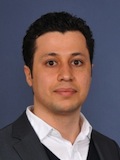Go to
May 21, 2014
The bio-inspired artificial pancreas for treatment of diabetes
21 May 2014 at 14:30 in INF 328
Pantelis Georgiou, Imperial College, London, UK
Abstract:
Our body is capable of controlling the glucose released from the food we eat, through release of insulin, a hormone secreted from an organ called the pancreas. Type 1 diabetes is an auto-immune disease that affects the pancreas in our body by destroying the beta-cells, the cells which produce this hormone. This results in an extremely high concentration of glucose, which when not regulated can lead to severe secondary complications such as blindness, heart disease and nerve damage and effect the quality of life of people suffering from diabetes. Type 1 diabetes currently affects 10% of the 285 million people suffering from diabetes and its incidence is increasing rapidly.
In order for intensive management of diabetes there is a need for an artificial equivalent which is capable of sensing the glucose from the blood when we eat and releasing insulin in a continuous closed-loop fashion. In this talk I will present my development of the bio-inspired artificial pancreas, a closed-loop system that replicates the functionality of the biological pancreas to deliver real-time glucose control. At the heart of the device lies the silicon beta-cell, a CMOS microchip which replicates the behaviours of the beta-cells of the pancreas and when connected to a glucose sensor can calculate the amount of insulin you need to stay healthy and reduce all the aforementioned secondary complications. I will show promising results of our clinical trials of the device, which is currently being worn by people suffering from diabetes.
About the speaker:
 Pantelis Georgiou received the M.Eng. degree in Electrical and Electronic Engineering in 2004 and the Ph.D. degree in 2008 both from Imperial College London. He then moved to the Institute of Biomedical Engineering where he was appointed as a Research Fellow until joining academic faculty in 2011.
Pantelis Georgiou received the M.Eng. degree in Electrical and Electronic Engineering in 2004 and the Ph.D. degree in 2008 both from Imperial College London. He then moved to the Institute of Biomedical Engineering where he was appointed as a Research Fellow until joining academic faculty in 2011.
He is currently a lecturer within the Department of Electrical & Electronic Engineering and is also the head of the Bio-inspired Metabolic Technology Laboratory in the Centre for Bio-Inspired Technology and part of the Medical Engineering Solutions in Osteoarthritis Centre of Excellence.
His research includes bio-inspired circuits and systems, CMOS based lab-on-chip technologies and application of micro-electronic technology to create novel medical devices. He conducted pioneering work on the silicon beta cell and is now leading the project forward to the development of the first bio-inspired artificial pancreas for Type I diabetes.
Dr. Georgiou is a member of the IEEE and IET. He has been elected a member of the BioCAS and Sensory Systems Technical Committee of the IEEE Circuits and Systems Society.
Secondary navigation
- January 29, 2018
- August 30, 2017
- Past seminars
- 2016 - 2017 Seminars
- 2015 - 2016 Seminars
- 2014 - 2015 Seminars
- 2013 - 2014 Seminars
- 2012 - 2013 Seminars
- 2011 - 2012 Seminars
- 2010 - 2011 Seminars
- 2009 - 2010 Seminars
- 2008 - 2009 Seminars
- 2007 - 2008 Seminars
- 2006 - 2007 Seminars
- August 31, 2007
- June 29, 2007
- June 20, 2007
- June 5, 2007
- May 30, 2007
- May 16, 2007
- May 15, 2007
- April 24, 2007
- March 27, 2007
- March 14, 2007
- February 9, 2007
- February 8, 2007
- January 12, 2007
- December 5, 2006
- November 14, 2006
- October 31, 2006
- October 27, 2006
- October 26, 2006
- October 20, 2006
- September 20, 2006
- September 20, 2006
- September 20, 2006
- September 19, 2006
- 2005 - 2006 Seminars
- August 23, 2006
- August 22, 2006
- June 26, 2006
- June 20, 2006
- June 16, 2006
- June 7, 2006
- June 6, 2006
- May 30, 2006
- May 17, 2006
- May 10, 2006
- April 27, 2006
- April 12, 2006
- March 31, 2006
- March 29, 2006
- March 22, 2006
- March 15, 2006
- February 27, 2006
- February 8, 2006
- January 25, 2006
- January 19, 2006
- January 18, 2006
- January 17, 2006
- January 11, 2006
- November 30, 2005
- November 23, 2005
- November 2, 2005
- October 26, 2005
- October 25, 2005
- October 5, 2005
- September 28, 2005
- 2005 Seminars

